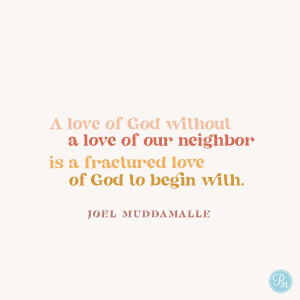
“And he said to him, ‘You shall love the Lord your God with all your heart and with all your soul and with all your mind. This is the great and first commandment. And a second is like it: You shall love your neighbor as yourself. On these two commandments depend all the Law and the Prophets.’” Matthew 22:37-40 (ESV)

The most important voice we need to hear to instruct us on racism and injustice is the voice of Jesus. In Matthew 22:37-40, we hear Jesus answer the Pharisees' question of what is the greatest commandment. His response masterfully and intentionally answered their question by connecting two commandments that flow into each other:
“You shall love the Lord your God with all your heart and with all your soul and with all your mind. This is the great and first commandment. And a second is like it: You shall love your neighbor as yourself. On these two commandments depend all the Law and the Prophets.”
Love the Lord your God.
Love your neighbor.
Our love of God requires and compels us to love our neighbor. A love of God without a love of our neighbor is a fractured love of God to begin with. Jesus emphasizes the importance of these two truths by saying that both of these commandments are the hinge that the law (the writings of Moses) and the prophets (the rest of the Old Testament) hang on.
To fully understand the weight of Jesus’ word, we have to rewind and look at the past. We could turn to so many places in the Old Testament (Amos, Zechariah, Leviticus and Deuteronomy), but one of the most helpful places for us to start is Micah 6:8. “He has told you, O man, what is good; and what does the Lord require of you but to do justice, and to love kindness, and to walk humbly with your God?”
The prophet Micah speaks out on behalf of two types of people: those who are in poverty and those who are in the margins of society. Micah is dealing with both racism and social classism, which are both offensive to God. Micah responds by calling the people of God (and calling us today) to walk humbly with God, do justice and love mercy.
Walk humbly: This is an image of walking hand in hand in intimacy with a father. As a child, when we walk in the shadow of our parents, hand in hand, we are humbled by their presence, and we live and act as a result of that humility.
Do justice: The Hebrew word for justice is “mishpat,” and it deals with a legal decision. This speaks of having systems and structures that are not morally bankrupt but reflect the righteous justice of God.
Love mercy: As a people who’ve experienced extravagant and undeserved mercy, we should pour out extravagant mercy onto others, even if it’s undeserved.
Jesus teaches us that these three characteristics mentioned in Micah 6:8 should be embodied and reflected in the lives of Christians as we relate to our neighbors.
Who is our neighbor? Every image bearer of God. In other words — all of humanity. As Christ-followers, we love God with every ounce of our being, and we’re then sent out to love our neighbors to be a reflection of the love, mercy and justice of God. This is what can be referred to as the “Law of love” (Romans 13:8-10; Galatians 5:14; James 2:8; John 13:34-35).
Jesus is telling His people today to walk humbly, do justice, love mercy and love all of humanity. Will we listen to His voice and instruction?
Lord, thank You for teaching us so clearly what it means to love our neighbor through Your Word. Thank You for the gift of the Scripture and how it has the power to instruct and guide us in every situation and circumstance. Empower us through Your Spirit to live a life of love that serves as a sign and symbol of the goodness of the gospel to our neighbors that may not know You. Help us, Lord, when things are hard. Remind us to lean into You through Your Word by the power of Your Spirit and not on our own understanding. Stir our affections for You, King Jesus, and be with us as You’ve promised. In Jesus’ Name, Amen.
Galatians 5:14-15, “For the whole law is fulfilled in one word: ‘You shall love your neighbor as yourself.’ But if you bite and devour one another, watch out that you are not consumed by one another.” (ESV)
James 2:8, “If you really fulfill the royal law according to the Scripture, ‘You shall love your neighbor as yourself,’ you are doing well.” (ESV)
There is no magic formula for discerning God’s voice. We can learn to recognize it the way we recognize the voices of those close to us: by knowing Him. In the booklet, Is God Speaking to Me?, Lysa TerKeurst shares her own wrestling with these questions and how God has taught her to more clearly discern His direction in her everyday life. Right now, you can get two copies of Is God Speaking to Me? Available for FREE, with a donation of your choice! Click here to learn more.

To connect with Joel Muddamalle, the Director of Theology and Research at Proverbs 31 Ministries, visit him on Instagram.
What are some reasons it’s so hard to love our neighbors? What’s an example of how to overcome those challenges?
How can you practically live out God’s commands to do justice and love mercy?
We’d love to hear from you! Share your thoughts in the comments.
© 2020 by Joel Muddamalle. All rights reserved.
Join the Conversation